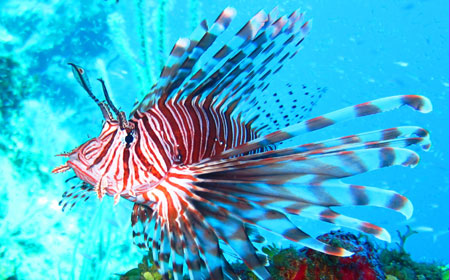BACALAR CHICO MARINE RESERVE, Thurs. Mar. 5, 2015–A lobster has been found in the stomach of a lionfish by Blue Ventures scientists in Bacalar Chico Marine Reserve. The 170 mm juvenile slipper lobster was found in the stomach of a 31-cm lionfish during its dissection. The lionfish was culled on the December 14, 2014 on a forereef site of the reserve. This is the first recorded evidence of lionfish consuming lobster in Belize.
Native to the waters of the South Pacific and Indian Oceans, lionfish were first recorded in the Atlantic in the 1980s, have since expanded their range across the Caribbean, and have been recorded as far south as Brazil. The Belize Barrier Reef System forms the core of the Mesoamerican Barrier Reef System and lionfish are now found across the entire region.
This visually stunning creature hides its voracious appetite for local unsuspecting fish and invertebrates behind its handsome facade, consuming almost anything that crosses its path.
The result is the impeded population growth of ecologically and commercially significant species, leading to devastating effects on the marine food web.
Belize’s beautiful blue waters attract tourists from far and wide to dive and snorkel the exquisite reefs and sample the local seafood Belize has to offer, in particular the spiny lobster. The Sea Around Us Project derived that total revenue from spiny lobster export earnings for 2011 was 7.6 million USD, and 500,000 USD from local consumption. This is by far the most dominant wild catch fishery in Belize providing income to thousands of fishers throughout the country.
The discovery of a lionfish that has consumed a slipper lobster brings concerns that this could be the gateway to consumption of the valuable spiny lobster.
Biologist and Belize coordinator of marine conservation organisation Blue Ventures, Jennifer Chapman, has worked on the invasive lionfish for the past four years and has been driving the development of control efforts for this invasive species. Concerning this new discovery, Chapman believes that ‘‘the negative impacts of lionfish on coral reef fish are well understood. What we don’t understand are the implications of the invasion on Belize’s lobster fishery; I consider this finding to be extremely concerning”.
Belize coordinator for the Healthy Reefs Initiative, Roberto Pott, agrees that this is cause for concern: “The implication of this finding is that more time and resources may need to be invested to determine if spiny lobster stocks are being impacted. Commercial species including lobster, conch, snappers and groupers already have to cope with existing threats from heavy fishing pressure and this is exacerbated by coastal development, incompatible tourism development, and climate change that results in the loss of important fisheries habitat.”
Not all, however believe that this finding will have direct implications on the spiny lobster fishery. Alexander Tewfik, science director for the Wildlife Conservation Society, says that “overall, spiny lobster will be less vulnerable to predation by lionfish than other crustacean prey due to their defensive capabilities (long antennae, gregarious nature), rapid growth and large size. However, we should remain vigilant as the lionfish invasion continues to evolve”.
Although the debate is out on how Belize’s lobster fishery will be affected, what is certain is the damaging impact that lionfish are having on reef health.
Lionfish populations have been able to grow quickly due to a lack of natural predators; however, in recent years there happens to be one in the making… human beings! These unwanted bandits make a delicious treat and are fast becoming the preferred fish at restaurants throughout the Caribbean. Simply ask music sensation Positive Vybz and he will tell you: “eatin lionfish, you kaan go wrong… everybody staat eat lionfish!”
“One of the biggest questions we hear is ‘aren’t lionfish poisonous to eat?’”, Chapman said when discussing challenges to marketing lionfish as an alternative to traditional reef fish. “The simple answer is ‘No’. A sting from the spines hurts, but these are removed by fishers at sea; the meat is completely safe to eat”.
Across Belize, residents are doing their part to take control of the lionfish population by incorporating it into their diet as well as fishing lionfish. There are even more creative ventures working with value added lionfish products such as jewellery made from its fins and spines.
In addition, Belize will be hosting the annual Reef Week celebrations from March 9-15. For the duration of the week, organisations across the country will be hosting events to celebrate the beauty and value of the coral reef. Events will be held throughout the country, so check out Reef Week Belize on Facebook to see what’s happening in your area.
For your opportunity to taste lionfish and learn more about this unruly predator, head over to BTL Park in Belize City on Sunday, March 15, and find the Sustainable Seafood Pavilion.
For more information about the invasive lionfish or to find avenues to sell your catch, drop by the Blue Ventures booth or email Jennifer Chapman at [email protected].

